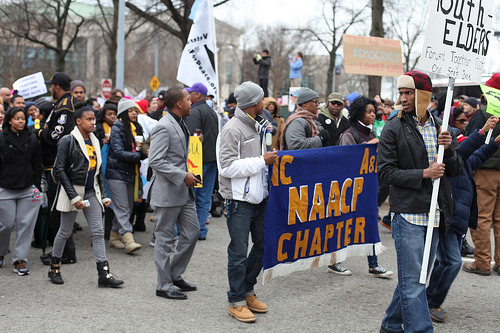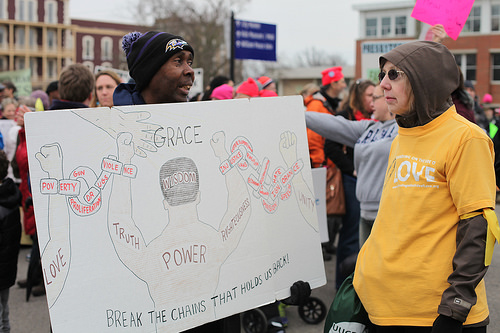The following post was written by Evan Seitz, Senior Associate for Service-Learning Programs at the UU College of Social Justice (UUCSJ).
On February 8th, I, along with thousands of others, participated in the Moral March in Raleigh, North Carolina. Many say this march, organized by the North Carolina NAACP and a broad coalition of progressive groups, was the largest civil rights protest since the march from Selma. The masses of people, the diversity of groups and people – from medical students and teachers to organized labor and the Sierra Club – the impassioned speech by North Carolina NAACP leader Rev. Barber – it was a heady experience for me. I loved the intensity of that weekend and the sense of solidarity I felt with the people of North Carolina.
For the people of North Carolina, the march was one event in a series of escalating acts of protest against repressive policies passed by the state legislature. The backbone of this movement began in 2006, when Rev. Barber began organizing a coalition of organizations now known as the Historic Thousands on Jones Street (HKonJ) Coalition. This coalition has committed to work together to advance a broad progressive agenda. They have amassed an impressive list of accomplishments, including raising the minimum wage and preventing the previous administration from passing restrictions on voting.
Things took a turn for the worse in 2012 when North Carolina elected Pat McCrory as governor. In 2013, the legislature, with the governor’s support, passed a series of radical and regressive laws. Unemployment benefits for thousands were terminated; voting access was curtailed; funding for public education was slashed. The voter suppression bill was made possible largely due to the 2013 Supreme Courts decision in Shelby County v. Holder, which struck down key provision of the Voting Rights Act of 1965. Prior to the decision, many counties in North Carolina required pre-clearance from the justice department before changing voting laws, effectively requiring pre-clearance for any state-wide rule changes. The new law requires voters to have an ID (student IDs are not accepted), ends same day registration, ends straight party voting, and reduces early voting.
North Carolina is not alone. Since 2011, nineteen states have passed new voter suppression laws – including all southern states except Louisiana. Fifty years after the American Civil Rights movement, we are engaged in a new fight to protect our right to vote.
The way forward on this issue is still not clear. Rev. Barber has said that he believes the key to a progressive United States is an organized South. Will Barber’s strategy of a “fusion coalition” be a key to organizing against these laws? What will the role be for allies who live in states that don’t have voter suppression laws?
And now for my pitch: consider participating in the Mississippi Civil Rights Journey this summer. A group of 30 UUs of all ages will travel Mississippi by bus, exploring the stories, songs, and struggles of the Civil Rights movement. Your guides will include veterans of the Mississippi Freedom Summer of 1964, and we will stop to talk to the organizers and activists who made that monumental summer possible. We will also talk to those engaged in the struggle against today’s voter suppression. You can learn more here.
Martin Luther King Jr. said, “the arc of the moral universe is long, but it bends towards justice. “ Let’s continue to stand with those who are doing more than their fair share to bend that arc. Let’s learn from those who have done this work before. And let’s continue to walk this road with humility and courage – forward together, and not one step back.



